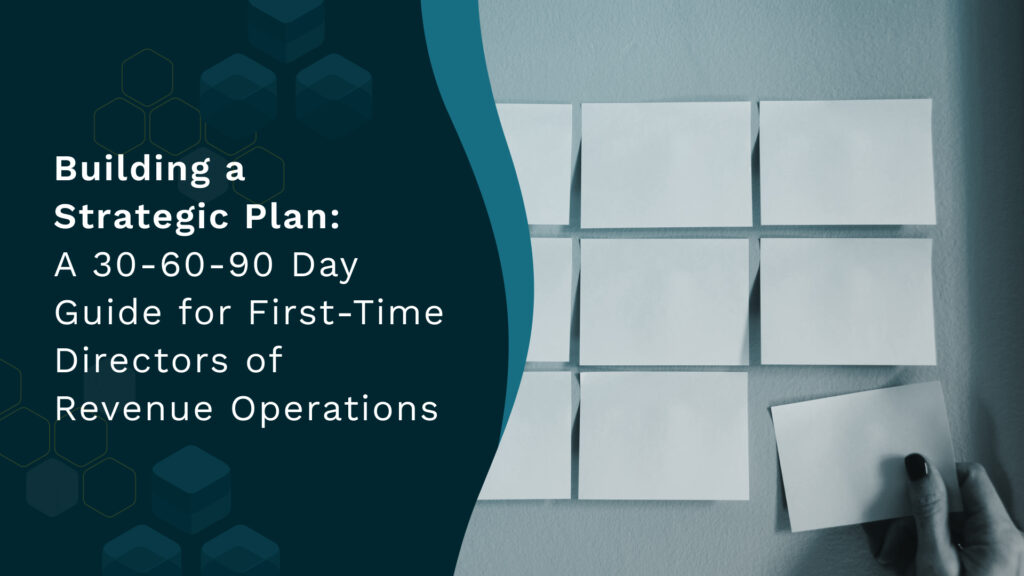
Top 10 Sales Enablement Software of 2025
Discover 2025's top sales enablement software, enhancing team productivity, customer engagement, and streamlining the sales process effectively.
Your sales reps have a mile-long to-do list. They need to generate leads, manage the pipeline, attend customer meetings, and follow up on a ton of other activities.
You’d agree it’s overwhelming.
With so many things to juggle, it can be difficult for them to figure out where to focus their energy. This multi-tasking is one of the biggest blockers for sales teams today. Shockingly, only 35.2% of a sales rep’s time is spent actively selling.
So, what’s the solution?
Give your sales reps the power they need to succeed with great sales enablement software.
In this article, we’re going to cover everything you need to know about sales enablement – from what it actually is, to the benefits you’re missing out on if you’re not using it for your sales team.
Plus, we’ll be sharing the ultimate list of the top 10 sales enablement software that you can use to turn your reps into super-reps.
Top 10 Sales Enablement Software of 2025
1. Nektar
2. SalesLoft
3. Groove
4. Cirrus Insight
5. InsideSales
6. Mixmax
7. Spotio
8. salesSimplify
9. Buzzboard
10. VanillaSoft
What is Sales Enablement?
Sales enablement is no longer a nice-to-have — it’s a must-have for any organization that wants to stay competitive in today’s rapidly evolving business landscape.
Forrester Research
Sales enablement is a term that’s been gaining popularity in the business world over the past few years. In a nutshell, it’s all about providing sales teams with the tools and resources they need to be able to sell more and better.
This can include things like product knowledge, sales training, customer insights, sales automation software, and other resources that can help sales reps get better at what they do.
The ultimate goal of sales enablement – increase sales.
Overview of Top 10 Sales Enablement Software of 2025
Now that you know what you should look for, we will give you a detailed comparison of the top 10 sales enablement software in the industry and how they can turn the tables for your sales processes.
1. Nektar
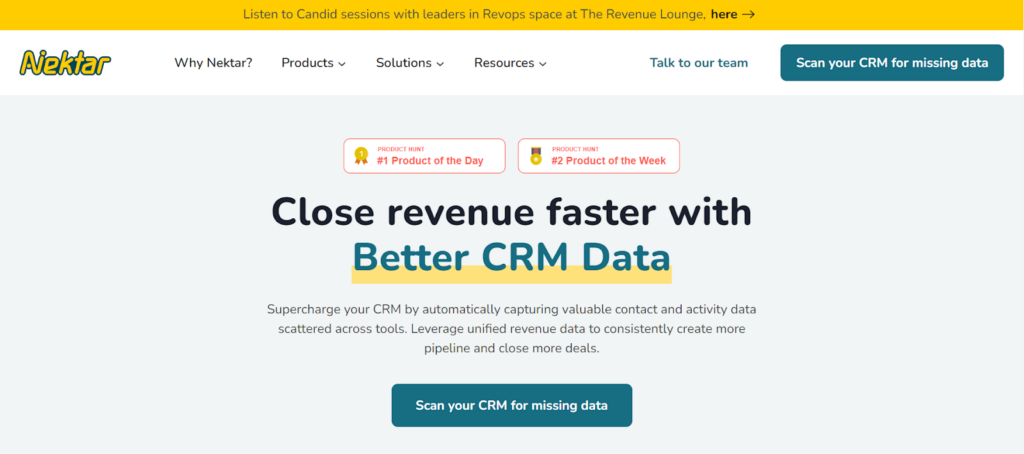
Nektar is a sales productivity platform that helps sales reps improve their performance and hit their targets by using data-driven insights and automation. It offers various tools and features that help streamline the sales process including automated data collection.
The platform enables sales reps to focus on what they do best – building relationships with prospects and closing deals. Nektar’s primary focus is to equip sales teams with the necessary tools and resources to kickstart their sales funnel effectively.
The platform enables sales reps to focus on what they do best – building relationships with prospects and closing deals. Nektar’s primary focus is to equip sales teams with the necessary tools and resources to kickstart their sales funnel effectively.
Key features:
- Automated tracking of leads, deals, and pipeline metrics
- Collaborative forecasting and scenario planning
- AI-powered revenue optimization insights
- Rules configuration for sales updates
- Real-time notifications and alerts for revenue insights
- Historical data analysis and trend forecasting
- User-friendly interface with customizable dashboards
- Integration with popular CRM platforms
2. SalesLoft
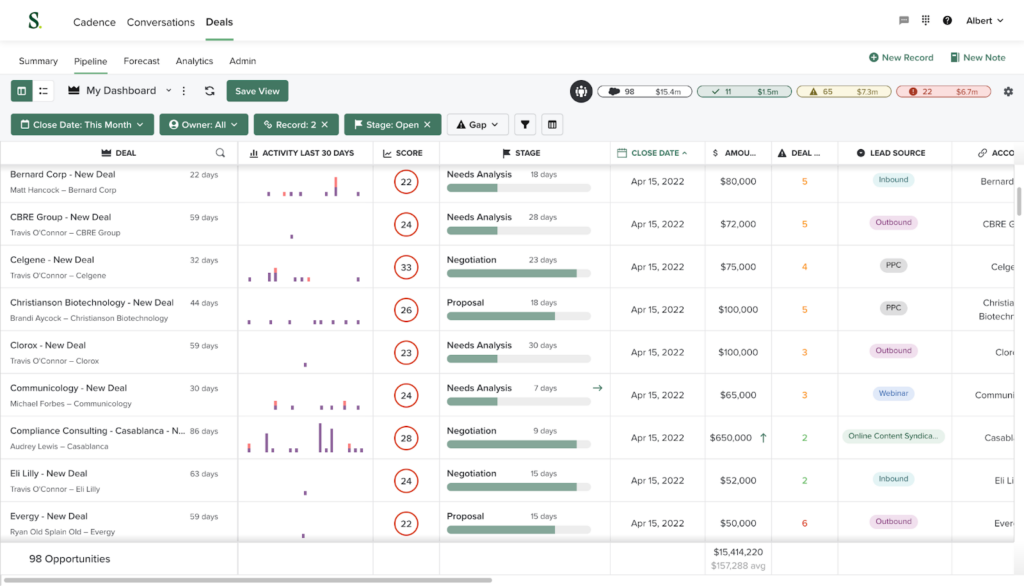
SalesLoft is a comprehensive sales engagement platform that is designed to help sales teams streamline their workflows and drive revenue growth.
The platform is known for its focus on personalized outreach and building strong relationships with customers, as well as its ability to provide managers with valuable insights and data to help them optimize their teams’ performance. Overall, SalesLoft aims to help businesses improve their sales processes, drive growth, and achieve their revenue goals.
Key features:
- Email tracking and scheduling
- Sales automation and cadence management
- Call tracking and recording
- Analytics and Reporting
- Social selling tools
- Sales coaching and training resources
- Customizable sales workflows
- Mobile app for easy access to the sales dashboard
3. Groove

Groove is a sales engagement platform that helps sales teams increase their productivity and efficiency. It offers various functionalities, with a focus on email tracking, CRM integration, sales automation, and analytics and reporting.
The platform is known for its user-friendly interface and ability to be customized to fit the specific needs of each sales team. Its goal is to streamline the sales process, improve collaboration, and ultimately drive better results for businesses.
Key features:
- Email tracking, scheduling, templates, and scheduling
- Real-time analytics and reporting
- Customizable sales workflows
- Sales coaching and training resources
- Mobile app for on-the-go sales
4. Cirrus Insight

Cirrus Insight is a sales engagement platform that is designed to integrate customer relationship management (CRM) tools like Salesforce, Gmail, and Office 365 into a single, unified platform
The main focus is on improving sales productivity and efficiency by enabling sales teams to manage all of their customer interactions and data in one place, while also providing managers with valuable insights to optimize team performance and drive growth.
Key features:
- Email tracking, scheduling, and templates
- Sales automation and workflow management
- Analytics and reporting
- Customer data management and segmentation
- Lead and opportunity tracking
- Campaign and pipeline management
- Calendar integration and scheduling
5. InsideSales
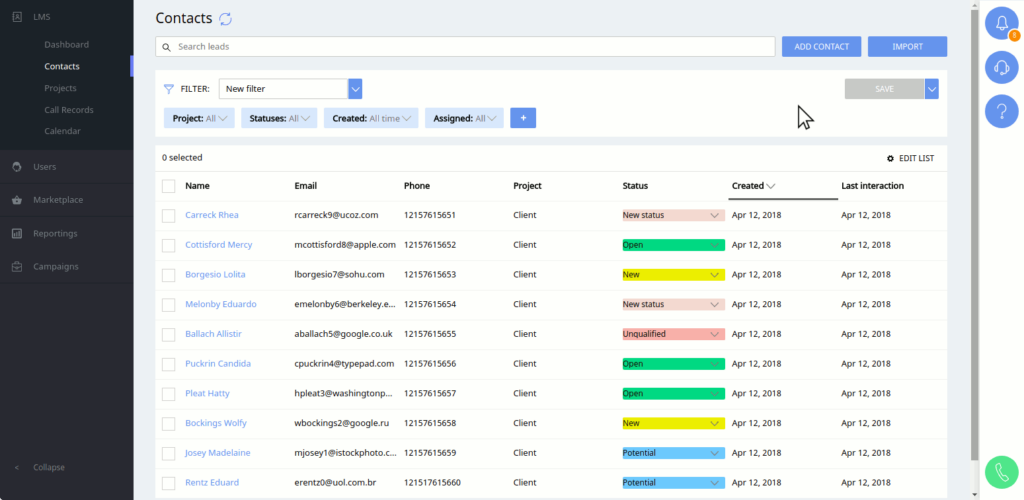
InsideSales is a sales engagement platform that leverages AI and machine learning algorithms to help sales teams prioritize leads, personalize outreach, and close deals more effectively.
The tool allows sales reps to work together on deals, share insights and information, and collaborate on sales strategies. The platform’s AI capabilities can also help sales teams identify hidden opportunities and potential areas for growth.
Key features:
- AI-powered predictive analytics
- Lead scoring and routing
- Email and call tracking
- Sales coaching and training
- Real-time insights and analytics
- Mobile app for productive sales
- Pipeline management and forecasting
6. Mixmax
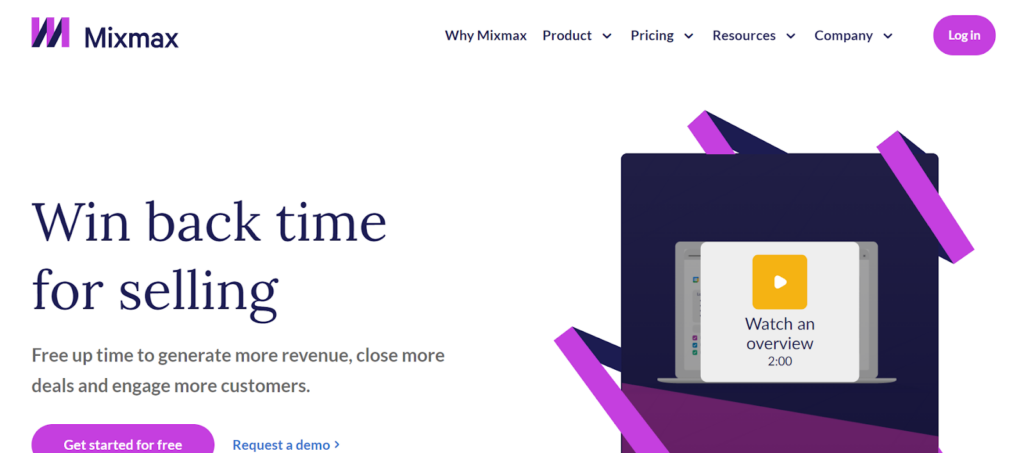
Mixmax is an all-in-one sales productivity and communication platform that provides a range of features and tools to help sales teams streamline their workflows, improve productivity, and close more deals.
The platform offers real-time collaboration and commenting, allowing team members to share insights and feedback on sales activities and customer interactions.
Key features:
- Email tracking and scheduling
- Email templates and snippets
- Calendar scheduling
- Automated and personalized email sequences
- Analytics and reporting:
7. Spotio
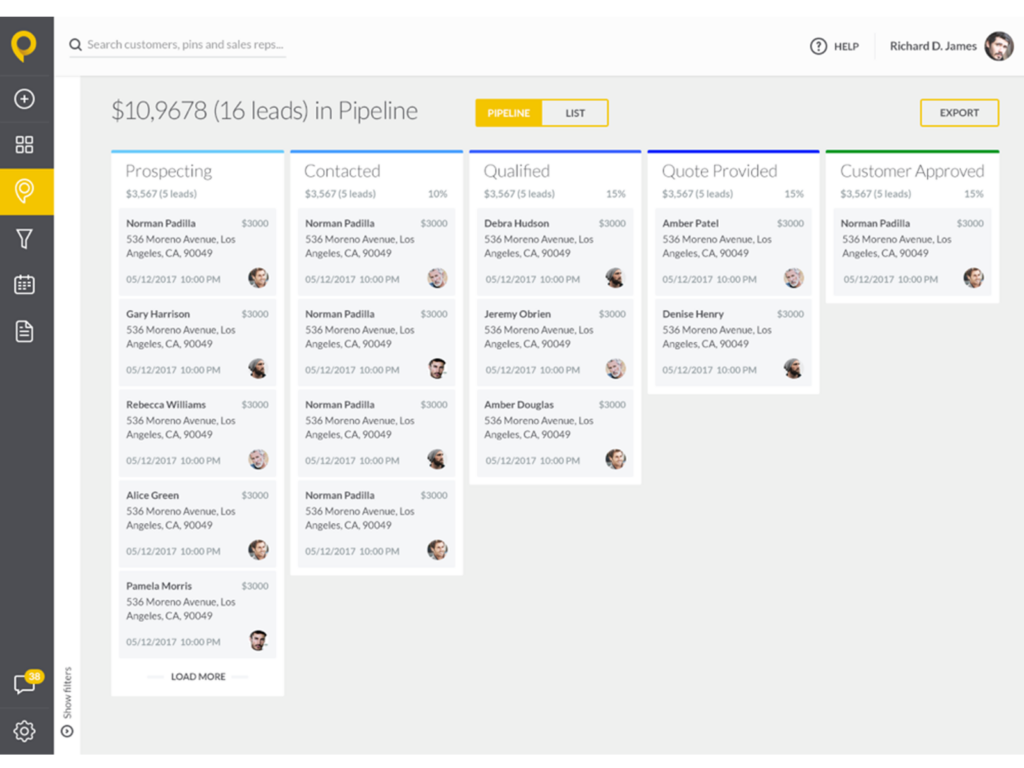
Spotio is a sales tracking and territory management software designed to help sales teams streamline their workflow and increase productivity.
It provides a mobile app that enables field sales reps to manage their territories, track their activities, and gain insights into their performance. The software helps in lead generation, pipeline management, and reporting, also allowing sales managers to track and optimize their team’s performance.
Key features:
- Activity tracking and analytics
- Lead generation and management
- Sales pipeline & territory management
- Customizable reporting
- Mobile app for field sales
- Real-time location tracking
- Automatic check-ins and follow-ups
8. SalesSimplify
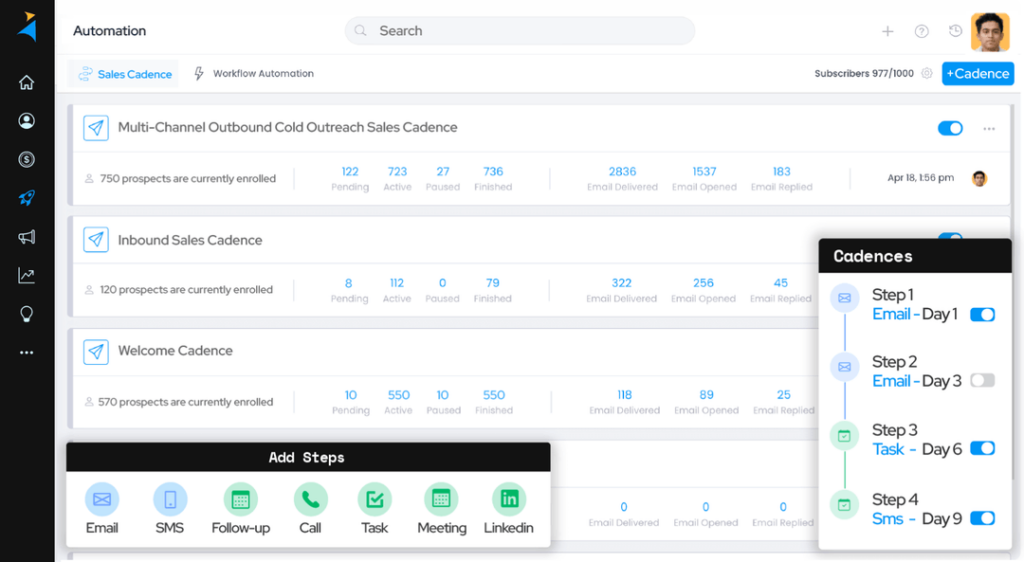
SalesSimplify is a comprehensive cloud-based customer relationship management (CRM) software that enables reps to efficiently manage their sales process. It allows them to schedule appointments, track campaigns, and manage their calendar.
The platform is powered by artificial intelligence and has been built with simplicity in mind and by individuals who understand what it takes to create a fulfilling sales experience, while also incorporating a sense of humor into the app.
Key features:
- Sales Automation with notifications
- Comprehensice sales CRM
- Lead bot with conversational forms
- Meeting Scheduler & LinkedIn Extension
- Sales Engagement with multichannel outreach
- Campaign management
9. Buzzboard
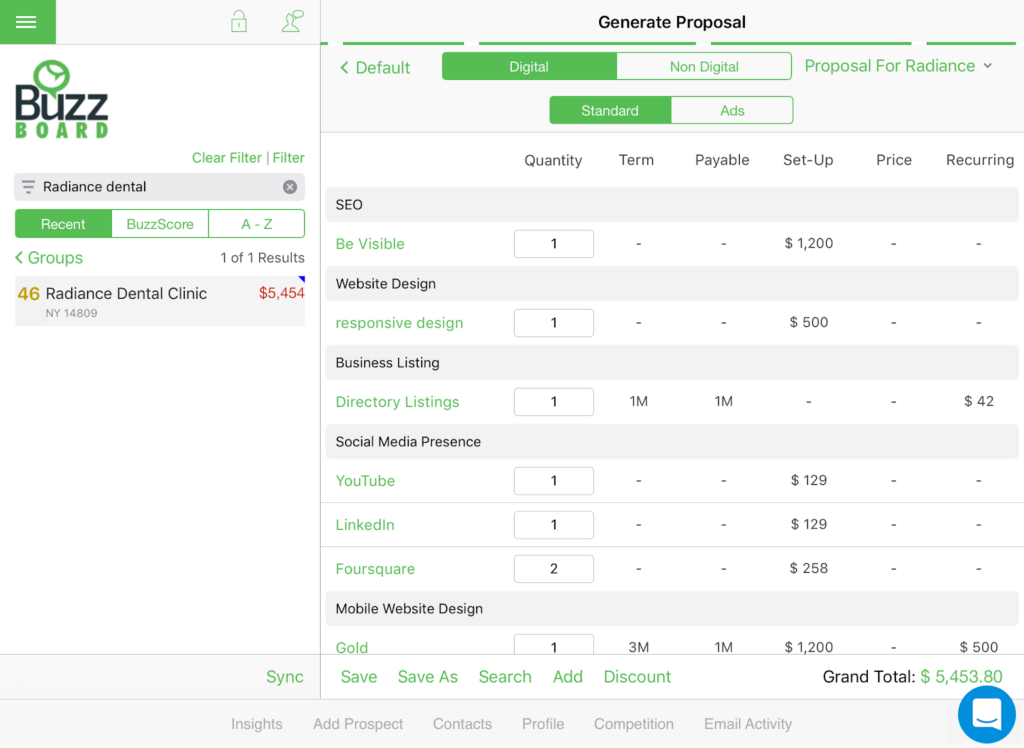
BuzzBoard is a powerful platform that offers AI-powered and human-verified account intelligence on over 30 million small and medium-sized businesses.
With BuzzBoard, businesses can focus their sales and marketing campaigns on SMB prospects that have the highest revenue potential. It’s an ideal solution for businesses looking to enable their agents to boost account-based sales and enhance marketing strategies.
Key features:
- AI-powered account intelligence
- Human-verified SMB data
- Revenue potential analysis
- Account-based sales and marketing campaigns
- Real-time insights and alerts
- Customized data reports and dashboards
- Competitor analysis and benchmarking
- Territory and market analysis
10. VanillaSoft

VanillaSoft is a sales engagement platform that helps sales teams manage their leads, automate their sales processes, and improve their overall productivity. It provides a complete suite of tools for lead management, appointment setting, and sales automation.
The platform uses AI-powered lead routing and prioritization to ensure that sales reps are focused on the most promising opportunities.
Key features:
- Auto Dialing and Call Recording
- Lead Routing and Distribution
- Sales Reporting and Analytics
- Appointment Setting
- Lead Scoring and Prioritization
- Multi-Channel Communication
But, Why Sales Enablement?
The idea behind sales enablement is to do more than enable agents. It is to create a more aligned approach between your marketing and sales teams so that everyone is working towards the same goals and objectives.
It’s time we delve deeper into such reasons and understand why sales enablement is more important than ever.
1. Sellers are expected to be advisors
Buyers today don’t just purchase products, they purchase solutions. They don’t consider reps as just reps anymore, they expect them to act as advisors who provide them with valuable insights and advice. In short, customer interactions are now more about building relationships.
For sales reps to deliver value beyond just selling a product or service, they need to have a deep understanding of their clients’ needs and provide them with tailored solutions that meet their specific needs. This is not possible without enabling the reps to sell to the modern customer.
2. Hybrid work is the new normal
48% of employees expected to work remotely compared to only 30% before the pandemic paving way for hybrid work models.
But that’s not the only challenge – a whopping 80% of decision-makers now prefer remote human interactions, adding to the complexity of sales.
This shift has impacted the way sales reps function, as they need to be able to communicate effectively with clients regardless of their location. Sales enablement can help sales reps to adapt to this new model by providing them with the tech and resources they need to sell effectively from anywhere.
3. The market is getting crowded
Customers have become more informed and conscious about their purchases. With the increasing competition in the market, the sky is the limit for their expectations. This puts pressure on companies to deliver exceptional customer experiences and to differentiate themselves from their competitors.
In 2023, 77% of the brands believe that CX is a key differentiator for companies. Sales enablement can help companies to meet these expectations by providing their sales reps with the knowledge, tools, and resources they need to deliver outstanding customer experiences and stand out from the competition.
4. Emphasis on being data-driven
Business owners have started to chase after being “data-driven”. And no, they are not wrong.
Data-driven companies are not only 23 times more likely to acquire customers, but they’re also 6 times as likely to retain customers and 19 times more likely to be profitable.
This makes it clear why data is becoming increasingly important in sales too. The right data helps companies in making informed decisions about where to invest their resources and which sales strategies are most effective.
Sales enablement can help sales teams to become more data-driven by providing them with the resources they need to collect and analyze data, and to use it to inform their sales strategies and decisions.
Elements of a Successful Sales Enablement Strategy
Success is the sum of small efforts repeated day in and day out.
Robert Collier
And this is no different when it comes to a successful sales enablement strategy. It is the result of several different factors working together in harmony to drive tangible results for your business.
Let’s discuss the key elements that make up a successful sales enablement strategy.
1. Clearly defined buyer personas
Understanding your target audience and creating buyer personas is essential for developing a sales enablement strategy that resonates with potential customers. This includes understanding your target audience’s pain points, needs, and buying behaviors.
2. Investment in content creation
Developing content that speaks directly to your target audience’s pain points and needs is critical. Even if the audience is not aware of the problem, it must be brought to light along with how your product can solve it. This can include case studies, whitepapers, blog posts, videos, and other types of content.
3. Sales training and coaching
Providing sales reps with the training and support they need to effectively communicate the value of your product or service to potential customers is of utmost importance. This can include training on product features, objection handling, and sales best practices.
4. Sales automation software
Implementing sales automation software, such as a CRM system and marketing automation platform, can help sales reps track leads and deals, monitor customer engagement, and optimize their sales strategies based on data-driven insights.
5. Continuous improvement
Regularly evaluating and adjusting your sales enablement strategy based on data and feedback is essential for optimizing your sales process and driving the long-term success of your sales pipeline.
By prioritizing the key elements of sales enablement and continually iterating your approach, you can build a sales organization that is equipped to engage effectively with potential customers. This can help your business drive revenue growth, and achieve long-lasting success.
We have just discussed that enabling your sales reps requires specific tools and software, We will now shift our focus to the factors that you should keep in mind when selecting sales enablement software for your reps
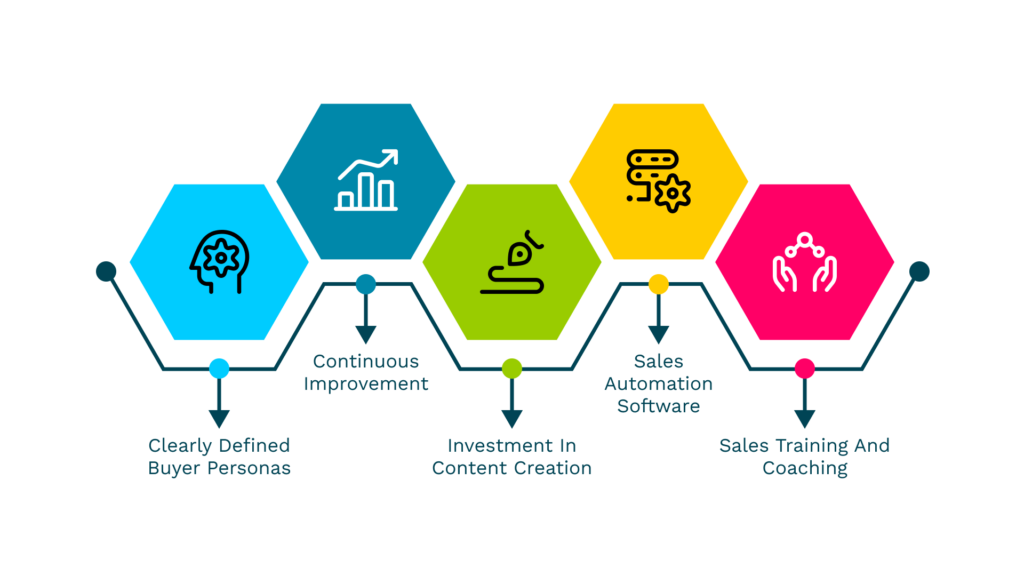
Checklist for Choosing a Sales Enablement Software
Congratulations on taking the first step to streamline your sales processes and boosting your team’s productivity.
But with so many options out there, it can take time to figure out where to start. Keep the below checklist handy if you are considering choosing sales enablement software for your reps.
1. Business needs
When selecting software, consider the size of your sales team, your target audience, and your sales goals. For example, if you have a large sales team, you may need a software solution that allows for efficient collaboration and communication between team members.
Similarly, if your team is remote or working in a hybrid model, you may need a mobile-friendly solution that enables your sales reps to make sales on the go.
2. Integration with existing tech stack
Sales teams who work closely with marketing teams see 41% greater growth in reaching their quotas. This underlines the importance of integration between multiple platforms and functions.
Your sales enablement software should seamlessly integrate with your existing tech stack, including your CRM, marketing automation tools, and other tools in your tech stack.
The integration makes sure that your sales team has access to all the information they need in one place, making it easier for them to sell effectively.
3. Ease of use
The software should be easy to use for both sales reps and managers, with a user-friendly interface and intuitive navigation.
A minimal learning curve can make it easy to adapt, enabling your sales team to quickly and easily access the information they need, reducing the time and effort required to go through it manually.
4. Customization for scalability
You are obviously in the business for growth. Therefore, your sales enablement software should be customizable to meet the changing needs of your business as it gets bigger and evolves.
The customization options make sure that the software would stay as a long-term partner for your business. The software should be able to adapt to new sales processes, changing customer needs, and evolving business requirements.
5. Analytics and reporting capabilities
After deploying the software, how will you measure the performance of your reps? You need to invest in software that could provide robust analytics and reporting capabilities to help you track key performance metrics, identify areas for improvement, and make data-driven decisions.
This data can help you optimize your sales processes, improve customer engagement, and increase revenue
6. Cost and return on investment (ROI)
Evaluate the total cost of ownership, including licensing fees, implementation costs, and ongoing maintenance, against the expected return on investment to ensure that the software provides a positive ROI.
Sales enablement software can be a significant investment for any business, so it’s important to ensure that you are getting the best value for your money. Make sure you are not investing in tools that your business doesn’t even need.
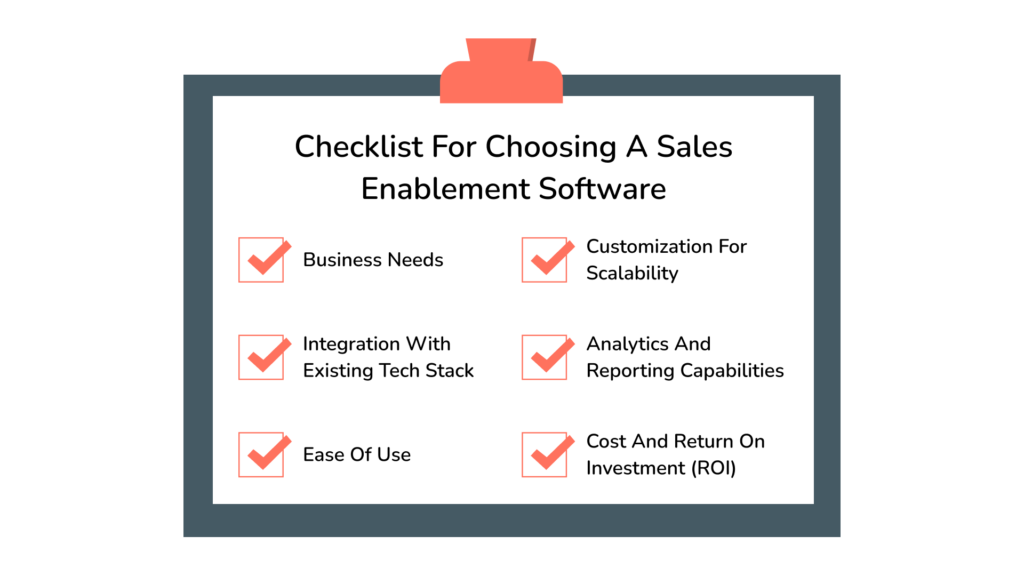
Empower & Conquer!
As sales cycles become more complex and buyers become more informed, sales enablement can provide a competitive edge by allowing your sales teams to deliver more value to customers, build stronger relationships, and close more deals.
Equip your sales team with modern sales enablement software to outperform your market rivals and break sales records. These powerful tools not only enable your reps but also enable your business to grow sustainably.
Take the first step towards empowering your sales team today by getting in touch with one of our experts at Nektar and watch your reps conquer new horizons like never before.
PUBLISHED BY
